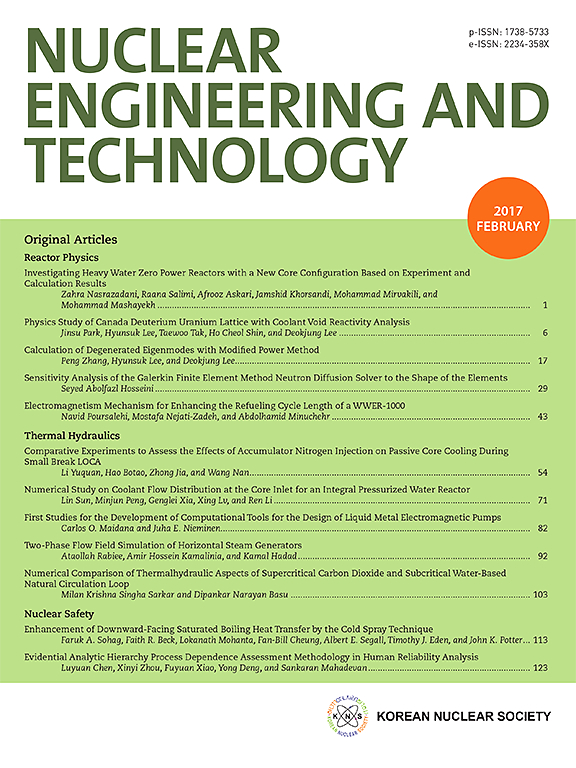基于cnn的非定常CFD小数据集加速深度学习架构比较
IF 2.6
3区 工程技术
Q1 NUCLEAR SCIENCE & TECHNOLOGY
引用次数: 0
摘要
虚拟核反应堆或数字孪生技术的CFD加速是核工业的主要目标。该研究比较了先进的卷积神经网络(CNN)架构在加速非定常计算流体动力学(CFD)模拟中的应用,该研究使用了基于具有挑战性的自然对流流数据集的小数据集。在相同的条件下,对自动编码器、UNet和ConvLSTM-UNet等先进架构进行了评估,以确定它们在自回归时间序列预测中的预测精度和稳健性。ConvLSTM-UNet始终优于其他模型,特别是在差值计算方面,实现了更小的最大误差和稳定的残差。然而,误差累积仍然是一个挑战,将可靠的预测限制在大约10个时间步长。这突出表明需要加强战略以提高长期预测的稳定性。这项工作的新颖之处在于它在RePIT框架内对最先进的CNN模型进行了公平的比较,展示了它们加速CFD模拟的潜力,同时确定了小数据条件下的局限性。未来的研究将集中于探索替代模型,如图神经网络和隐式神经表征。这些努力旨在为长期非定常CFD加速开发一种强大的混合方法,有助于在虚拟核反应堆中的实际应用。本文章由计算机程序翻译,如有差异,请以英文原文为准。
Comparison of CNN-based deep learning architectures for unsteady CFD acceleration on small datasets
CFD acceleration for virtual nuclear reactors or digital twin technology is a primary goal in the nuclear industry. This study compares advanced convolutional neural network (CNN) architectures for accelerating unsteady computational fluid dynamics (CFD) simulations using small datasets based on a challenging natural convection flow dataset. The advanced architectures such as autoencoders, UNet, and ConvLSTM-UNet, were evaluated under identical conditions to determine their predictive accuracy and robustness in autoregressive time-series predictions. ConvLSTM-UNet consistently outperformed other models, particularly in difference value calculation, achieving lower maximum errors and stable residuals. However, error accumulation remains a challenge, limiting reliable predictions to approximately 10 timesteps. This highlights the need for enhanced strategies to improve long-term prediction stability. The novelty of this work lies in its fair comparison of state-of-the-art CNN models within the RePIT framework, demonstrating their potential for accelerating CFD simulations while identifying limitations under small data conditions. Future research will focus on exploring alternative models, such as graph neural networks and implicit neural representations. These efforts aim to develop a robust hybrid approach for long-term unsteady CFD acceleration, contributing to practical applications in virtual nuclear reactors.
求助全文
通过发布文献求助,成功后即可免费获取论文全文。
去求助
来源期刊

Nuclear Engineering and Technology
工程技术-核科学技术
CiteScore
4.80
自引率
7.40%
发文量
431
审稿时长
3.5 months
期刊介绍:
Nuclear Engineering and Technology (NET), an international journal of the Korean Nuclear Society (KNS), publishes peer-reviewed papers on original research, ideas and developments in all areas of the field of nuclear science and technology. NET bimonthly publishes original articles, reviews, and technical notes. The journal is listed in the Science Citation Index Expanded (SCIE) of Thomson Reuters.
NET covers all fields for peaceful utilization of nuclear energy and radiation as follows:
1) Reactor Physics
2) Thermal Hydraulics
3) Nuclear Safety
4) Nuclear I&C
5) Nuclear Physics, Fusion, and Laser Technology
6) Nuclear Fuel Cycle and Radioactive Waste Management
7) Nuclear Fuel and Reactor Materials
8) Radiation Application
9) Radiation Protection
10) Nuclear Structural Analysis and Plant Management & Maintenance
11) Nuclear Policy, Economics, and Human Resource Development
 求助内容:
求助内容: 应助结果提醒方式:
应助结果提醒方式:


